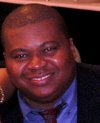
SPARKS IN THE DARK
Selected Poems by Jacques “thehaitianfirefly” Fleury
2006,
I’ve had the good fortune of knowing “the firefly” for about a year now, featuring him first in my column for the North Cambridge Alewife, “Words & Music”. It was in fact exactly a year ago, March 2005, when we talked about his childhood in Haiti, his mother’s red dress (which almost cost her life to the gangster Ton Ton Macoute) and his profound love for her. Born in Port-au-Prince, Haiti he told me that he came to America when he was 13, but not on an immigrant boat, on American Airlines. And there begins the wondrous “zebra stripes” of a maverick poet with Jacques’ humor, fortitude and transition to a new world. He looks back and he looks forward in his latest release of poems with a strikingly passionate Purple Rain cover. The dedication reads:
“For my dear and relatively sainted mother, who is the most intrinsically beautiful woman I have had the pleasure of knowing and will ever know and who knows me better than anyone else alive today! Thanks for believing in your very own, “Garcon MamMam.’
In his opening piece, The Totally Unfabulous World of a Haitian Firefly, he goes through his coming of age, leaving Haiti behind, with his courageous mother insisting:
SNAP OUT OF IT!….Haiti is behind us now.” And then he writes, “Still I sleep in a clamorous still, in nightmares influenced by subversive ideologies….” Yes the poet’s imagination remains haunted by his roots, the exploding guts of a country called, Haiti.
In the next selection he affirms just who he is, in Creole with line by line English translations: “the haitian fire fly that’s me.” “I grew up taking blood baths, basking in the epoch of oppression.” “I am a Creole poet” “but my nation was occupied by the French.” “But still I am a Creole poet.” “My Caribbean spice rack is stock full of flavored stories…”
From The Haitian Fire Fly Speaks!
And indeed Jacques is full of spice and sparks of language about his experience, the world he sees, the light and darkness in it, those he loves, friends he is inclined to practically worship with words…as in A Goddess Intervenes, for Colleen, the Goddess of Love, which I heard him recite at Squawk just a week ago….
Interestingly, Jacques is so empathic the last few lines remind of me of something Colleen herself might write:
“One day she opened her eyes in horror/to see the moon a reddish color!/to see her world of beauty in fury/crumbling around her like a fallen deity/so then she crumbles too;/ having been made of snow,/ with wrath of the wind broke through her window,/then there she lies like the ashes of winter,/succumbed to the intemperate weather/then I watch her die, beautifully die. From A Goddess Intervenes
Jacques is a rarely blessed talent who blends together a strong historical awareness and sensuality and unusual syntax that is both compelling and enlightening. Sometimes his poems are pitched to an almost Shakespearian crescendo, and then there is the child-like brilliance of a poem like, Krik Krak:
“Krik Krak
I am like an almanac
So use me to count your days
War was here and war did play
Bruised bodies are on their way”
Krik Krak
I am like a tic tac
Sweet smelling breath of storms
We are pulled from our roots feeling forlorn
Fallen over knee deep in crap flowers grow thorns…”
Krik Krak
I say you said what?
Werewolves walk around in sight
Creep back in your mother’s womb in fright
But sooner then later all must come out to fight!”
You say you want a revolution, well read Jacques’ poems. He has his eye on the past and the future and his own yearnings. He has his eye on America and Haiti. He has his heart in love with people who sustain and teach him. And Jacques knows in his abundant soul, how to give back.
NB: Also, you will find Jacques’ column on the Alewife website, http://www.thealewife.com/, currently a tribute to Black History month.
His book is available at his readings and at The Out of the Blue Gallery on Prospect St. in Cambridge. Go and buy it! Check him out!
Lo Galluccio
Ibbetson St. Press





































